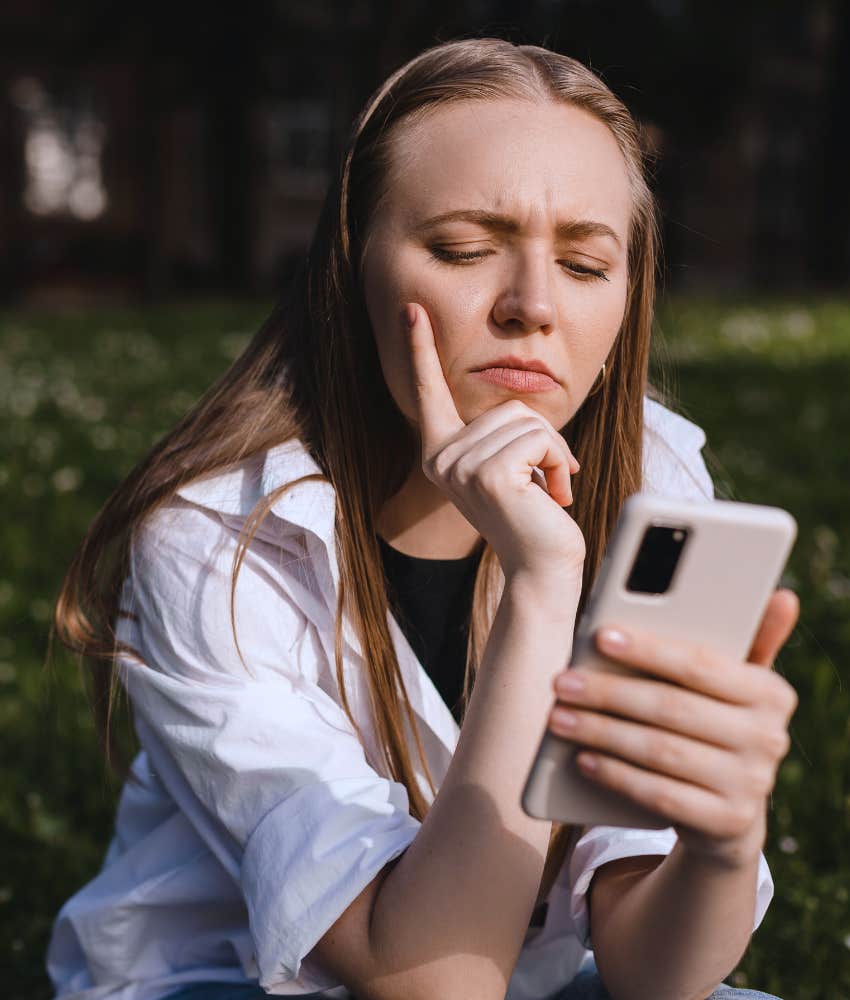Should Couples Share Passcodes To Unlock Each Other's Phones? Experts Say 'Yes, But...'
You have a right to decide for yourself what works for you and your relationship.
 Kaboompics | Canva
Kaboompics | Canva Boundaries are important in every relationship, and all couples should have them. When it comes to your partner wanting to unlock your phone, it's hard to know if you should keep your passcode a secret or share it freely.
Every couple has its ways of maintaining boundaries that may change as the relationship grows. However, too many boundaries can give rise to insecurities, jealousy, and a lack of trust.
Phones can be a divisive factor. To overcome these worries, you or your partner might think it’s best to remove any barriers and have full access. But is this a healthy solution? We asked a group of experts including couples therapists, life coaches and counselors for insight.
Should couples share passcodes to their phones? Experts share risks and rewards
There’s no how-to manual when it comes to navigating relationships, so whether or not you have your partner’s passwords is totally up to you. But it helps to weigh up some pros and cons so you’re making a good decision for the right reasons.
"It's not about the phone..."
 Ekateryna Zubal via Shutterstock
Ekateryna Zubal via Shutterstock
Eva Van Prooyen, Marriage and Family Therapist and Relationship Specialist, says, "It’s not really about the phone — it’s about how the couple navigates anything that carries emotional weight or ambiguity. What matters most is whether they have a process in place to handle sensitive topics with fairness, mutuality, and emotional generosity.
"In secure-functioning relationships, the answer to phone access is typically yes, but it comes with clarity, consent, and context. Access isn’t a shortcut to trust; it’s a result of it.
"Once a relationship becomes exclusive, emotionally safe, and oriented around shared purpose, openness around devices should begin to feel natural, not forced. You wouldn’t hand over the keys to your house on the first date, but once someone shares your home, it’s strange to keep certain rooms locked.
"It helps couples create a foundation where openness isn’t about testing loyalty — it’s about protecting the relationship from secrecy, power struggles, and shutdowns. The goal is a relationship where access is freely given, decisions are mutual, and no topic is too taboo to talk about."
Intuitive coach Ronnie Ann Ryan agrees. "If you are fully committed for the long-term, and past the one-year mark, I would say this is an option. Of course, this level of openness might not suit everyone, but there can be consequences when it does not," she told us.
What are the risks of sharing your passcode with your partner?
Access to a partner's phone can feel controlling
Asking for your partner’s passwords is a risky move that could easily be perceived as possessive, controlling, and untrusting.
Counselor Richard Drobnick adds that "sharing phone passcodes is less about privacy and more about emotional needs. One partner often needs space to feel respected, while the other needs openness to feel secure. Pushing for access too early can backfire: one may feel controlled, and the other may feel excluded or suspicious.
"When they understand what each other needs and choose to share passwords freely, it helps them feel reassured. Likewise, when a person understands how their partner works and doesn’t apply pressure, they’re more likely to open up on their own. This level of trust usually grows with commitment.
"When a couple is truly committed and understands each other’s emotional needs, sharing phones becomes a sign of trust, not surveillance. This usually happens after mutual emotional security is established, when both feel safe being themselves without fear of judgment, and their feelings are treated with care. Trust like this doesn’t follow a timeline; it grows from genuine connection."
In any relationship, particularly new relationships, privacy is important. Having access to each other’s phones or other devices forces transparency rather than allowing you two to open up naturally. This can backfire and leave you both feeling as though your boundaries have been disrespected.
Removing passwords seems like a logical solution in a situation where you feel your partner is being secretive or hiding something from you. But unlocking phones does not solve trust issues. You have to get to the root of your problems if you want to maintain a loyal, healthy relationship.
Sharing passcodes can replace communication
If you’re checking your partner’s phone for answers instead of confronting them, you’re only adding to the breakdown in communication.
Life coach Mitzi Bockmann shares that "Committed couples should share passcodes and be able to access each other's phone. A relationship is nothing without trust, and that includes what is on one's phone. (After all, it's a phone, not a birthright.)
"The key is 'committed'. When a couple agrees they are a couple, they should agree to share passwords. It should not be brought up for the first time when one person expects the other to be doing something. Hopefully, by the time a couple wants to commit to each other, they will actively want to share their lives with them completely."
Talk openly with your partner if you feel their secrecy is a red flag. If you suspect cheating or are worried by your partner’s online habits, don’t ask for their password; instead, ask for honesty and a behavior change.
Even though it might seem like a good idea when you’re together, knowing each other’s passwords can be detrimental in a breakup.
No one thinks they’ll have a toxic breakup until they have one, and then, all of a sudden, you’re apologizing to your boss for an email your ex sent, or are desperately trying to contact your bank to cancel your cards.
In any case, make sure you change your passwords immediately after your breakup to avoid these kinds of repercussions.
The rewards of sharing phone passcodes
Sharing phone access can create security and connection
Sharing passwords can feel good in a relationship if it helps remove any barriers and makes you feel more connected.
Counselor Susan Allan says, "Some spouses have had excruciating experiences previous to their current relationships, and even the slightest thought of their partner's infidelity triggers a response that can easily end in rage, violence, or divorce. For those spouses, you might expect that I would suggest that they have full access to their partner's phones, when in fact, the opposite is true.
"Someone suffering from PTSD linked to previous infidelity is too vulnerable to misinterpreting a friendly text from a worker or friend, and I've seen too many devastating marital upsets. I have then had to teach one or both of the spouses to calm themselves so they can peacefully resolve what is most often a little smoke and no real fire.
"Other spouses are very open and very relaxed and not particularly jealous. They know their relationship is stable and solid, and they would be able to understand whatever text they would see as mild flirting. This type of spouse probably wouldn't ask for their partner's phone passcode.
"Many spouses are cheating in this era when divorce and separation are so prevalent. And they are very cagey to avoid being caught in their deceptions before they are ready to move on, if that is their plan.
 PeopleImages by Yuri A via Shutterstock
PeopleImages by Yuri A via Shutterstock
Dr. Aline Zoldbrod, a physchologist and sex therapist, suggests that sharing passcodes can be helpful after betrayal.
"One really interesting aspect of this practice has to do with healing rifts in trust, particularly when there has been an emotional or sexual betrayal with another person," she told us. "In this situation, as the therapist, I have found it to be really helpful."
However, she also warns that "if the person doing the cheating is a serial cheater, then all that he or she would have to do is get a burner phone", which is yet another reason sharing phone passcodes cannot replace direct, honest and loving conversation and trustworthy behavior.
As a therapist, she notes that, utlimately, she doesn't see any difficulty in couples choosing to do this when they get more serious adding that "it seems like an interesting midway point that you could pick before you get to a more social commitment signal like an engagement."
This offers a fun idea: you could make sharing phone or computer passcodes a true milestone in your relationship, like committing to one another, going public on social media, moving in together, or engagement!
Provided you trust each other fully and still have healthy boundaries, it can feel good to know that neither of you has anything to hide. When you’ve been together for several years, you’re probably already living in each other’s pockets, so it might make sense to have full access.
There are practical benefits to sharing passcodes
If you’re in an emergency, you might need quick access to each other’s phones to contact someone. Who has time to be guessing your partner’s first pet or mom’s birthday in a high-stress scenario?
Ronnie Ann Ryan shared that she had a friend whose husband of 20 years never shared his passcodes, and that worked out fine for them — until he passed away and his wife found herself locked out of all of his devices. "She had no way to reach out to his contacts and let them know of his passing," Ryan explained. "That's why my husband and I can get into each other's phones and computers."
Having this level of access doesn’t mean you’re snooping through each other’s texts or emails. You can know each other’s passwords for convenience's sake without overstepping the mark. After all, just because you have their code doesn't mean you have to use it!
When deciding whether or not to share passwords, it’s essential that both partners consent fully.
Sharing passwords shouldn’t be used as a solution to any trust issues or lack of honesty, nor should it replace regular, open communication. If your relationship is solid, sharing passwords shouldn’t have any radical impact one way or the other.
However, as Ryan told us, "If you are committed and trust each other, then I would find keeping secrets like this confusing. If you don’t trust each other or have doubts, that might tell you something about your relationship."
Alice Kelly is a writer with a passion for lifestyle, entertainment, and trending topics.

